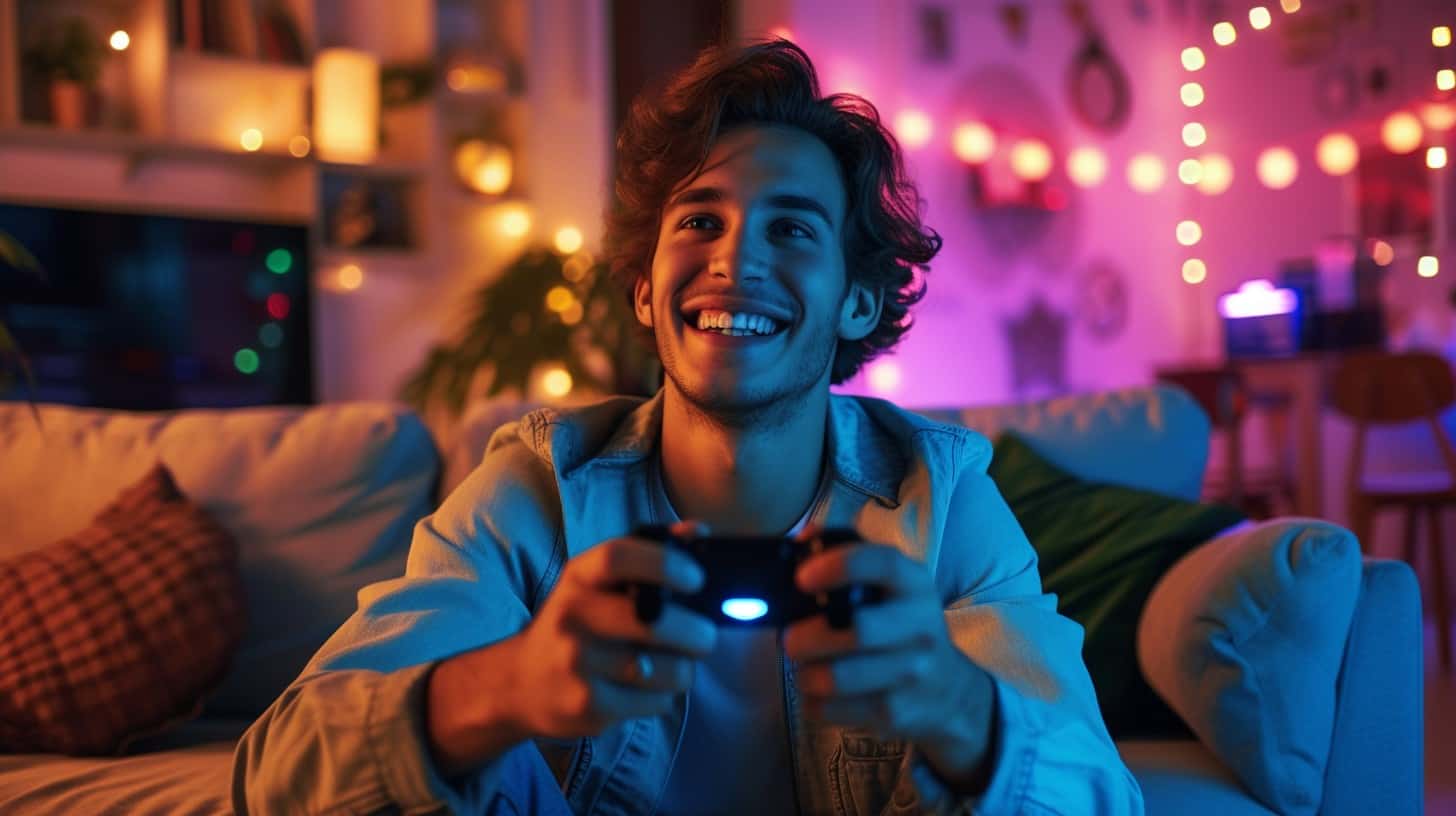Hey there, fellow joystick warriors—got that nagging feeling your solo gaming marathons might be messing with your headspace? You’re not alone. The gaming world’s whopping $180 billion worth of pixels and quests have us all hooked, big-time.
But don’t fret; I’m here to unpack the effects of those endless hours in front of the screen on mental health and offer some leveled-up strategies to keep your mind as sharp as your gaming skills.
Ready for some real talk about staying healthy while chasing high scores? Let’s dive in!
Key Takeaways
Too much gaming alone, especially among boys and young men, can lead to addiction and social skill problems. It affects how they connect with others in the real world.
Playing games by yourself can be a way to escape stress and boost happiness. But if it gets in the way of sleep or important tasks, that’s not good for your health.
Games have power in our lives—they shape pop culture and even the economy. The gaming industry is very big, making over $180 billion!
Having balance is key when you game. Mixing up playing time with other activities helps keep mental health in check.
Parents play an important role too! They should guide kids on how to enjoy gaming while also doing other healthy things like schoolwork or playing outside.
Table of Contents
The Culture of Gaming Alone
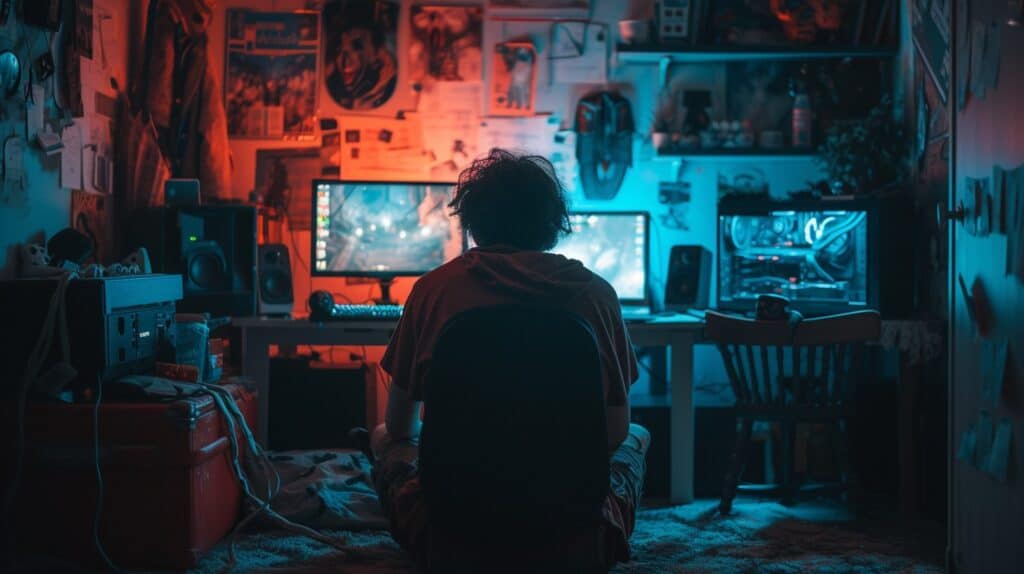
The Culture of Gaming Alone: Let’s face it, the image of a lone gamer, headset on and immersed in a virtual world, has become as iconic as the solitary figure of a cowboy against the Wild West sunset… except with more LED lights.
This shift to playing solo isn’t just about personal preference—it’s reshaping societal norms and how we interact, or—irony alert—don’t interact with each other.
The Generation of Young Men Isolated by Video Games
A lot of young men today are finding themselves in a world where gaming screens glow more than the sun outside. It’s easy to get lost in virtual worlds—places like Norrath or grand, online battlefields.
They hop from one game to another, and before they know it, hours have zoomed by. This “boy crisis” has guys spending heaps of time playing alone instead of hanging out with friends.
What’s worse? Some fellas end up jobless and still glued to their controllers, putting games before real-life goals. National surveys have a sad story to tell: unemployed dudes often choose gaming over almost anything else; even basic stuff like eating or catching Z’s gets missed.
When video games start calling the shots, that’s when you gotta pause—and not just for your next game mission—but for life itself!
The Shift from Social Activities to Gaming Alone
Now, let’s talk about how things have changed. It used to be that hanging out with friends was the go-to for fun times. Nowadays, more and more people are choosing gaming as their main way to relax.
This big change has young guys spending less time with others and more time alone with their games.
One fact sticks out — back in 1990, nearly half of young men would turn to a buddy when they had something personal on their minds. Fast-forward to today, and that number’s chopped in half! We’re playing our favorite games solo instead of catching up face-to-face or shooting hoops at the park.
The need for friendships hasn’t vanished; it’s just that controllers and keyboards are filling spaces where conversations used to happen.
Playing video games isn’t bad, but too much can lead us down a lonely path. If we’re gaming just because real life feels like too much, well… that might not be so great for our heads and hearts.
And hey – connecting over a good game is one thing; forgetting how awesome it can feel to share laughs in person is another!
The Effect of Gaming Alone on Mental Health
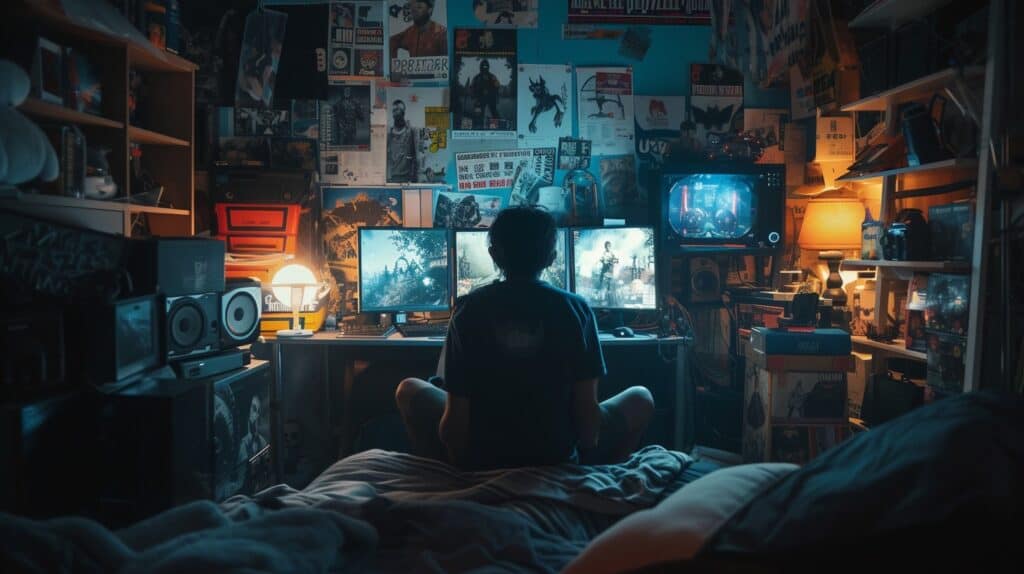
Hey there, gamers! Let’s dive into a real-talk moment about flying solo in the gaming world. Ever wonder what locking yourself away with your console might be zapping from your social battery or mental wellness? I’m talking about those long hours where it’s just you, the screen, and maybe an occasional pizza delivery…
Could this cherished “me time” actually have some downsides for our mental health? Stick around; we’re about to uncover whether gaming alone is purely a sweet escape, or if we might be unwittingly hitting the self-sabotage button on our wellbeing.
The Relation Between Gaming Alone and Addiction
Playing video games alone can be a blast – you get to choose your adventure, move at your pace, and enjoy some ‘me’ time. But it turns out that too much solo play might lead to something not so fun: addiction.
The brain loves rewards, and when you score big in a game or beat a level, dopamine – the feel-good chemical – floods your system. This reaction can keep you coming back for more.
Some folks are starting to notice they can’t put the controller down, even when it’s causing trouble in other parts of their lives. Yep, that’s what doctors call “gaming disorder.” It’s like the game has taken over and becomes more important than hanging with friends or even taking care of yourself.
Guys seem to have an even tougher time with this; they’re more likely to fall into the gaming trap where hours fly by in what feels like minutes.
So watch out for signs that gaming is getting too sticky – if it’s messing with school or work stuff or keeping you from spending time with real-life pals. And remember there’s life beyond the screen! If things are feeling off-balance, maybe try mixing gaming up with other hobbies or catch-up sessions with friends.
Now let’s explore why boys seem drawn like magnets to video games…
Why Boys are More Prone to Gaming Addiction
Boys often get hooked on games. It’s like a magnet; they just can’t pull away. The thrill of winning and the challenge keep them coming back. Almost every teen boy in America dives into video games, making it a huge part of their daily life.
That gaming glow? It’s actually dopamine, their brain’s feel-good button getting pressed over and over.
Think about it – boys are usually super competitive. They want to be the best, nail that high score, or beat the toughest level. This drive piles onto that constant urge to play more and win more.
Plus, lots of guys find friends in these virtual worlds when they’re not hanging out face-to-face with pals in real life.
The Impact of Gaming Alone on Social Skills
So, gaming addiction hits boys hard. But there’s more to this story. Gaming alone can mess with social skills big time. Scientists have found that people who game a lot might not be as good at understanding others or working well with them.
Picture this: you spend hours beating levels, but when it comes to real-life team work? You’re just not in the groove.
Okay, so you love your solo game time—cool! But here’s the thing; it could make dealing with folks face-to-face kinda tricky. Some gamers even start feeling anxious around crowds and shy away from chit-chat.
Plus, if heavy gaming means less hanging out in person, friendships can hit rough patches too—ouch! It’s like your social muscles need a workout just as much as your thumbs do.
The Psychological Aspects of Gaming Alone
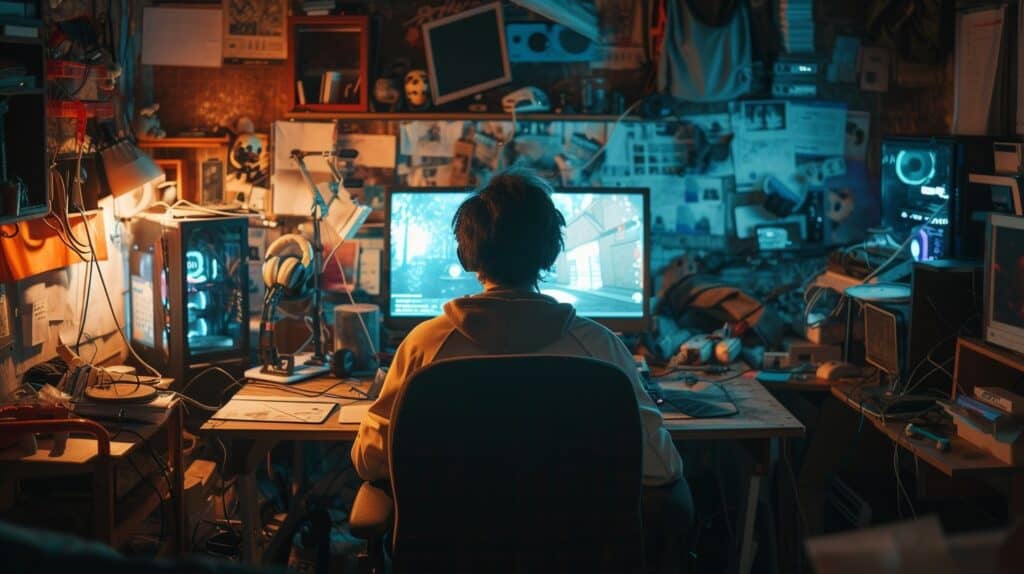
Alright, let’s dive headfirst into the deep end of our own minds, shall we? When it comes to flying solo in the gaming universe, there’s more going on upstairs—in our noggin—than most folks realize.
It’s not just about blasting aliens or racing cars; it’s an emotional rollercoaster with twists and turns that can leave us feeling like we’ve been teleported to another dimension (and I’m not talking about level 9 of Space Invaders).
So buckle up, players—one-handed while you keep that joystick steady—we’re about to explore what makes gaming alone a psychological journey worth pressing ‘start’ for.
Gaming as a Form of Escape
Sometimes life throws a lot at us. We feel stressed, alone, or just tired of the same daily routine. So, we look for a way out – even if it’s just for a little bit. Gaming can be that escape hatch.
It lets us jump into worlds where we’re heroes, adventurers, or anything else we want to be.
It’s like taking a mini-vacation without leaving your chair! You get to forget about your worries and have some fun. But there’s more happening here than you might think; getting lost in these virtual lands can change how you see things in the real world, too.
That sense of winning and making progress? It boosts happiness big time – giving gamers little victories they carry back into their day-to-day lives.
The Relation Between Gaming and Sociopolitical Attitudes
Escaping into video games can be a blast, but there’s more to the story. Studies show that gamers who play a lot might start to care less about what’s going on in the world and helping others.
Over time, someone lost in their virtual adventures may not think much about serious stuff like politics or how to make the community better.
This isn’t just guessing – research backs it up. When we’re talking teens playing games by themselves, there seems to be a link between all those hours spent gaming and not being super into social issues or activities outside their screens.
It’s like they get so wrapped up in game worlds that real-world problems don’t hit home as much. And let’s face it, being part of what’s happening around us makes for a healthier society, right? So if gaming alone means tuning out from these important conversations, that could be something to watch out for.
The Positive Aspects of Gaming
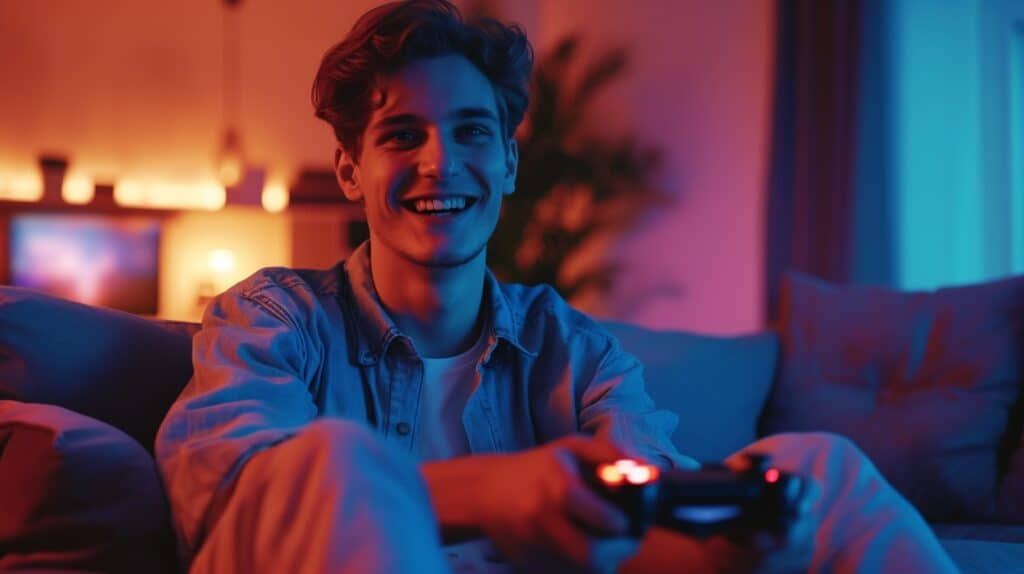
Sure, let’s not forget that gaming isn’t all doom and gloom! Amidst the concern over isolation, there lies a pixelated silver lining—gaming can actually be a force for good. It’s like stumbling upon an unexpected power-up in your day; engaging with games has been known to foster connections, buff up problem-solving skills, and even offer a digital dose of therapy…
How’s that for flipping the script?
Using Gaming to Connect with Others
Gaming isn’t just about sitting alone in your room—it can be a way to make friends and share experiences. Picture this: you log into your favorite game and join a group of players from all over the world.
You tackle challenges together, chat about strategies, and laugh over shared jokes. It’s like having a bunch of pals right there with you, even if they’re actually miles away.
Now imagine playing games that teach you new stuff or help solve problems—yeah, those exist! Some games are made for learning and others for teaming up to fight big battles or build amazing things.
This is where gaming turns social; as you work together and learn from each other, the experience becomes a blast. Moreover, online safety is paramount in ensuring everyone plays fair and has worry-free fun.
When it comes to safe online casinos, exploring a variety of games, understanding the odds, and discovering different strategies can enhance your overall gaming experience. Additionally, staying informed about the latest promotions, bonuses, and reliable payment options contributes to a seamless and enjoyable online casino journey. To delve deeper into these aspects and more, you can check out this page for more information on maximizing your online casino experience.
The Therapeutic Effects of Gaming
Imagine this: you’ve had a rough day and need to unwind. So, you pick up a controller and dive into another world where you’re the hero, solving puzzles and completing quests. That’s gaming for you – it’s like your personal zone where stress just vanishes into thin air.
It can be so much more than fun. Some games act almost like prosocial tools that make us think about helping each other out.
Now, think of games as your helpers in practicing how to stay calm or even get better when feeling down (yes, they can!). Playing certain types of games might give your mood a boost or help with emotion regulation—a fancy term for keeping feelings in check.
This isn’t just talk; researchers have looked into it! They found that when people play these helpful games, they often feel good inside – sorta like after eating a big scoop of their favorite ice cream!
So next time someone tells you that gaming is only sitting alone in your room doing nothing helpful – tell them about its hidden superpowers!
The Negative Aspects of Gaming
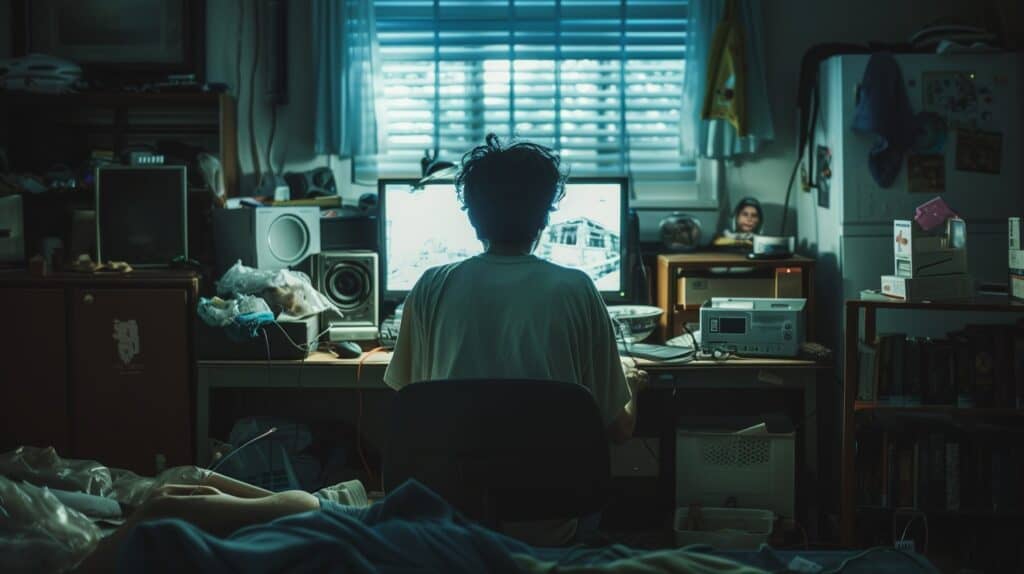
Oh boy, the dark side of gaming—yeah, it’s a thing. Ever found yourself on hour 6 of a marathon session and realized your eyes are twitchy and your back’s thrown in the towel? Let’s dive into those not-so-fun parts that can sneak up on us when we’re lost in those digital worlds, from sore thumbs to zombified sleep schedules, and why sometimes hitting “pause” is more than just a game move.
The Effects of Excessive Gaming on Physical Health
Gaming for too long can mess with your body. Some gamers skip meals, stay up late, or even miss showers because they’re so into their games. This isn’t good news for your health! Your body needs food, sleep, and cleanliness to stay strong.
Playing a lot of video games might also hurt how you pay attention when doing other things. It’s like the brain gets too used to the action in games and forgets how to focus elsewhere.
That can make school or work tougher than it should be. So remember, gaming is great but don’t let it take over – keep it fun without going overboard!
The Impact of Gaming on Sleep Patterns
Lots of American gamers say they play so much that they miss out on sleep. Imagine staying up late, lost in a game, then realizing it’s morning! That happens more often than you think.
Not getting enough sleep can mess with your head and body. It makes you tired and can’t think as clearly.
Playing games for too long can even make people skip meals or showers. And wow – some folks have missed work because of gaming! They might not realize how one more level or quest keeps them from hitting the sack at a good time.
So yeah, playing responsibly means knowing when to shut off the console and get some Z’s.
The Role of Video Games in Modern Society
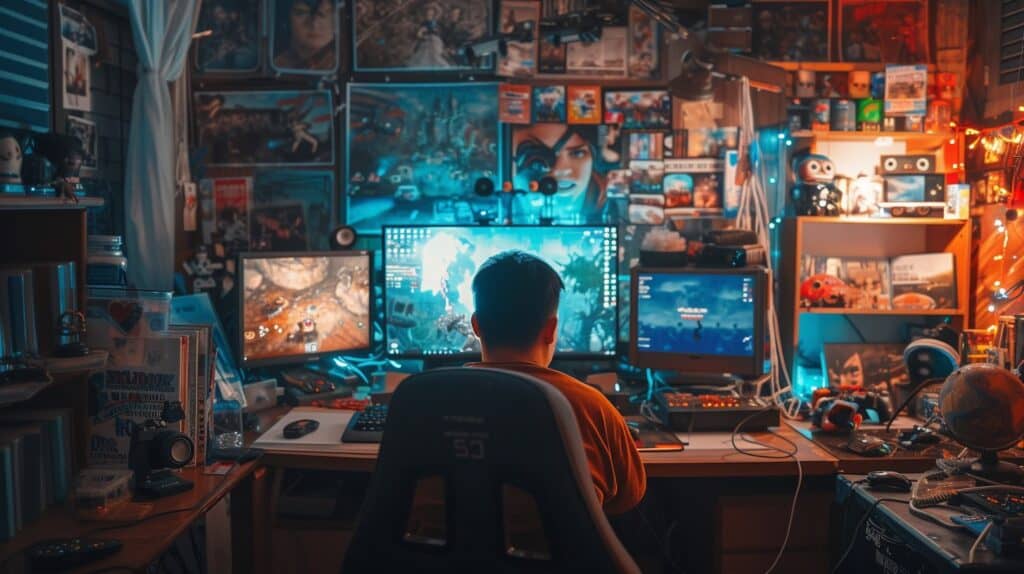
Well, here we are—the digital age, where video games are more than just a pastime; they’re a cultural juggernaut, shaping everything from the memes we share to the lingo slipping off our tongues.
They’ve even got their fingers in the economy’s pie—talk about influence!
The Influence of Video Games on Pop Culture
Think about it—video games are everywhere. They’re in movies, fashion, and even the way we talk. With a whopping $180 billion value, gaming isn’t just something people do for fun; it’s a huge part of what makes our culture tick today.
You’ve probably heard phrases from games out in the wild or seen someone wearing a shirt with a game character on it.
Picture this: you’re walking down the street and see someone rocking sneakers designed like something straight out of a virtual world. That’s gaming leaving its mark. It’s not only about entertainment anymore; video games shape how we express ourselves and connect with one another around the globe.
From memes to music inspired by game tunes, they’ve carved out their own space in pop culture history.
Next up? Understanding how all that screen time affects us when we’re playing solo..
The Economic Impact of the Gaming Industry
The gaming industry is huge, like super big! It’s worth a whopping $180 billion. That’s more money than a lot of countries make in a year. Now, imagine over 40 percent of folks around the world are playing video games.
Yep, that’s nearly half the planet having fun with their consoles and computers.
Okay, so get this – players spent about $93 billion just on extra goodies in their games in 2020 alone. We’re talking skins for characters, new levels, or even fancier swords – all those little things inside games you can buy.
That means companies are making bank on these microtransactions! And it shows us how much impact our love for gaming has on the economy out there.
Strategies to Mitigate the Negative Effects of Gaming
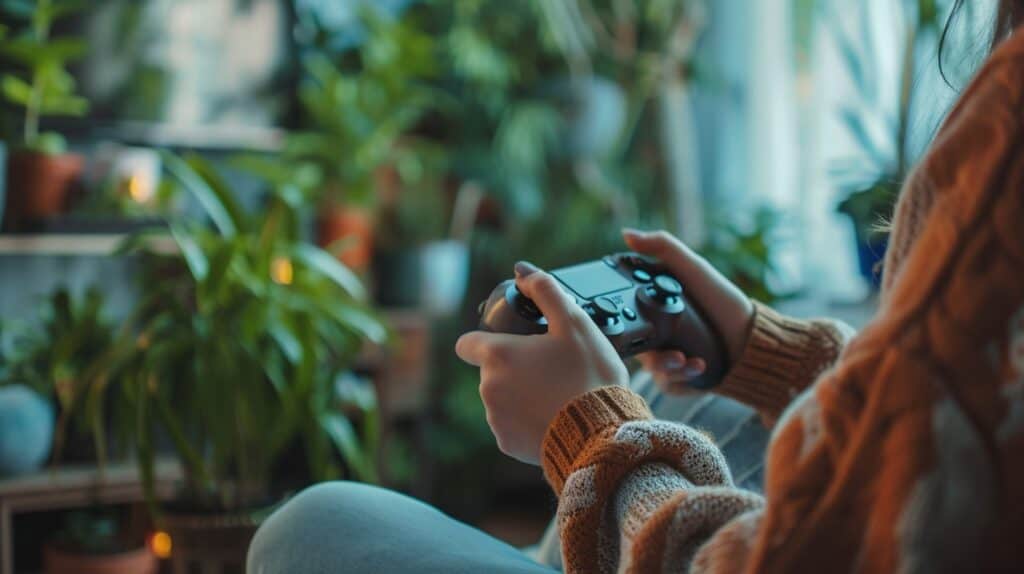
Okay, so we’ve chatted about the ups and downs of solo gaming—like a roller coaster for your brain, right? Now, let’s get real about how to not let our love for gaming mess with our vibe.
We’re talking balance, folks—it’s all about finding that sweet spot between nailing headshots and hitting the hay at a decent hour. No preachy stuff here; just some solid game plans to keep you feeling like the boss level champ you are!
The Importance of Moderation in Gaming
Gaming can be like a double-edged sword. It’s fun, sure, but too much of it, and you might find yourself missing out on sleep or skipping meals. Imagine pushing the ‘pause’ button in the middle of an epic game—not easy! Yet, that’s what moderation is all about.
Cutting down on gaming time can actually boost your mental clarity. Think about it: less zombie-like days from lack of sleep and more high-fives for nailing real-world goals.
Moderation also means setting limits to keep those dopamine triggers in check—those same chemical reactions linked with addiction and messing with your attention span. Yeah, balancing gaming with life’s must-dos isn’t just adulting; it’s smart playing.
It keeps you sharp for both worlds—the virtual quests and the day-to-day grind. Plus, who doesn’t want to dodge the health risks that come from being glued to the screen for too long? Not saying you gotta quit—just hit pause now and then!
The Role of Parents and Guardians
Parents and guardians have a big job. They should teach kids how to balance video games with other parts of life. It’s like mixing the right amount of gaming with homework, playing outside, and spending time with family.
Moms, dads, and others can help set rules for when it’s game time and when it’s not. And hey—they can join in on the fun too! Playing together can make gaming social and keep everyone connected.
It’s all about guiding young minds without pushing too hard. When parents understand what games their kids are into, they know better how to talk about them. They also see how these games might shape thoughts on important stuff—like what’s happening in the world today (that’s part of political attitudes).
Parents are kind of like coaches for healthy habits, leading by example and cheering from the sidelines as gamers win at moderation under Christ’s lordship.
The Need for Gaming Etiquette
Gaming can be loads of fun, but it’s important to play nice. Having good gaming manners can help everyone enjoy the game and stay friends.
- Respect other players: Treat them like you want to be treated. No yelling or mean words.
- Take breaks: Don’t play for too long at one time. It helps you and others to not get too sucked in.
- Share the game: If you’re playing with others, make sure everyone gets a turn.
- Help newcomers: Show new players how things work. Everyone starts somewhere!
- Keep noise down: If you’re on a headset, remember not everybody wants to hear loud noises or music.
- Stay calm: Games can get heated, but don’t let anger take over. Deep breaths help!
- No cheating: Winning feels great, but not if you cheat. Play fair, always.
The Future of Gaming
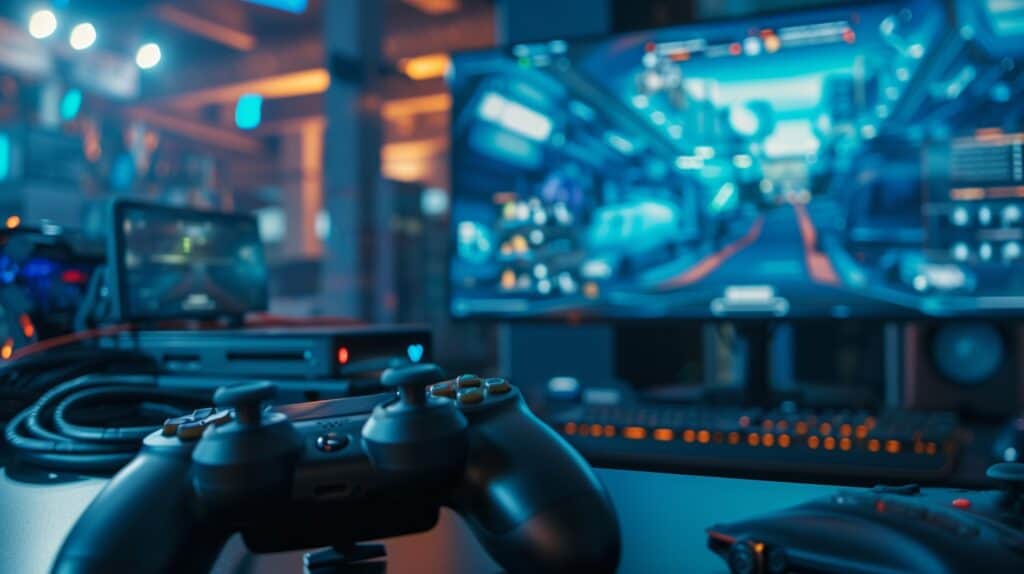
Oh, and just when you thought we’d exhausted the playground of pixels, the future of gaming swings into view – think social connections leveling up and virtual reality… a game-changer! (But hey, I’ve got some wild thoughts on where this joystick journey is headed – stick around, it’s gonna be one heck of a ride!).
The Rise of Social Gaming
Social gaming is taking the world by storm! Picture this: you’re sitting at home, but you’re also hanging out with friends from all over the globe. Cool, right? That’s what social games do—they connect people.
With a whopping 40 percent of folks around the planet playing video games, chances are high some of them are looking to make pals and play together.
Games aren’t just for solo quests anymore; they’re about teamwork, sharing epic wins, and sometimes even scoring college scholarships—yeah, really! Over 200 colleges have esports programs now.
They spot talented gamers and say, “Hey, come play for us—we’ll help pay for college.” Bet you didn’t think your gaming skills could help hit the books! Whether it’s joining forces in battle royales or trading strategies in MMOs (that’s massively multiplayer online), players are all about that connection button these days.
The Integration of Gaming and Virtual Reality
Gaming isn’t just about sitting alone with a controller anymore. It’s becoming a massive, shared adventure thanks to virtual reality (VR). Imagine strapping on a headset and stepping into another world where you can climb mountains, fight dragons, or even explore outer space—all from your living room.
VR gaming creates an immersive experience that traditional video games can’t match.
There’s big money in this tech wonderland—companies like ready their bets on VR being the next big thing in entertainment. You’re not just playing a game; you’re inside it! This blows the roof off what solo gaming used to be, as players can feel like they’re part of something much larger than themselves.
And trust me, trying to dodge virtual fireballs gets your heart racing way more than pressing buttons!
Now let’s do away with the idea that all video gaming is isolating. With virtual worlds at our fingertips, we get to meet people from around the globe without ever leaving our homes—it’s kind of like social media but way cooler because you’re doing stuff together in real time.
The future of gaming? It looks pretty thrilling from here—and hey, who wouldn’t want to have superpowers for an evening or slay mythical beasts before bedtime?
FAQs About Gaming Alone
Can playing games alone really mess with my mental health?
Oh, you bet! Gaming solo can lead to feeling lonely and might even make some folk feel more anxious or stressed out. It’s like eating a huge bag of chips when you’re hungry – it feels good at first, but later not so much.
Is there such a thing as too much gaming?
For sure – just like ice cream, a little bit is awesome, but too much? Hello tummy ache! If someone’s always on World of Warcraft or something and starts missing work… that’s bad news bears. That could be internet gaming disorder in action.
What do all those professionals say about video games and aggression?
Well, some folks reckon violent video games might get players amped up or show more aggressive behaviors – yikes! But hey, don’t freak out yet; not everyone turns into the Hulk after shooting zombies!
Are there any cool things about gaming for my noggin’?
Absolutely! Some brainiacs think that certain games can boost your creativity and problem-solving skills – it’s like giving your brain a workout without hitting the gym.
How can I game without winding up with zero friends and a sad face?
Balance is key – mix in time with pals (in real life), aim for goals outside of gaming, maybe try art therapy if you’re into that stuff… Just don’t let those virtual worlds hog all your time.
What should I do if I start feeling down from playing too many video games?
First off: Don’t panic! Chatting with someone who gets mental health care can help big-time—like cognitive behavioral therapy to untangle those mind knots or even music therapies to mellow your mood.
